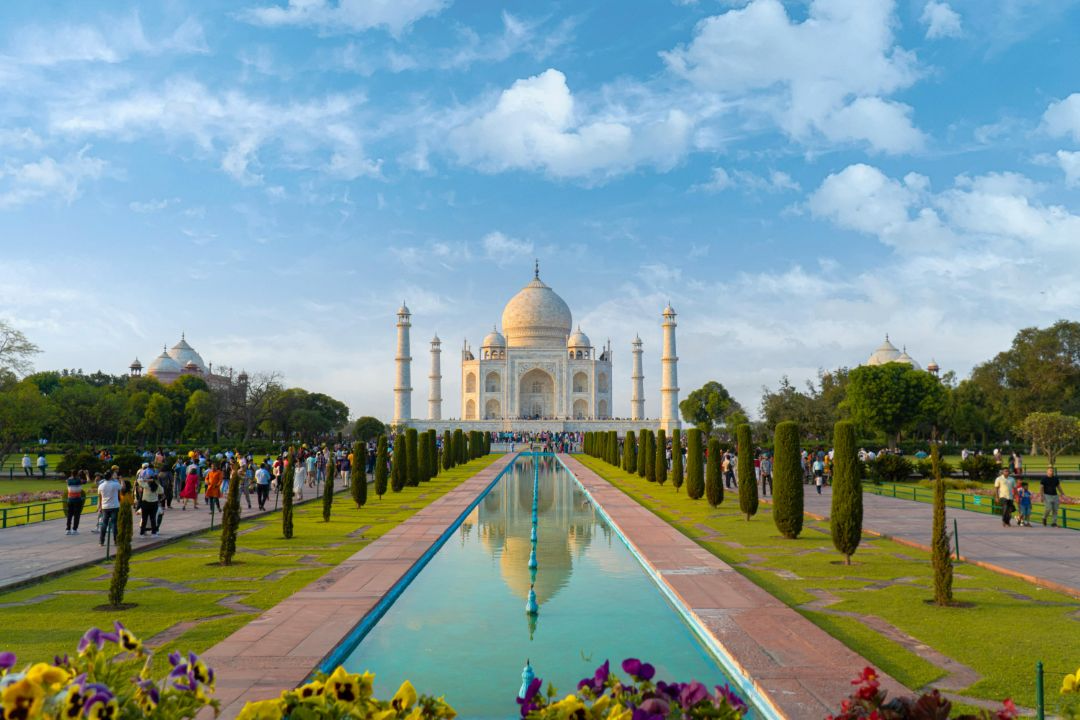The Taj Mahal Tour Package: A Complete Travel Guide
September 18, 2025

The Taj Mahal Tour Package: A Complete Travel Guide
The Taj Mahal is one of the most famous and visited landmarks in the world because it stands for everlasting love and architectural talent. This white marble beauty is hidden away on the banks of the Yamuna River in Agra, India, and millions of people come to see it every year. A Taj Mahal Tour Package includes seeing Agra's diverse culture, Mughal history, busy markets, delicious food, and friendly Indians.
This detailed guide is meant to help you plan your journey to the Taj Mahal in great detail. It has history, reviews, firsthand tales, cultural perspectives, local landmarks, and helpful travel tips. This site has all the information you need, whether you're going to Delhi for a day, a sumptuous overnight tour, or a longer holiday that concentrates on Mughal heritage.
The Story of the Taj Mahal: The Story of Love and Legacy
In 1632, the Mughal Emperor Shah Jahan had the Taj Mahal built as a tribute to his wife Mumtaz Mahal, who died giving birth. Shah Jahan, who was suffering severely, thought of a monument that would memorialize their love forever. It was created by more than 20,000 craftsmen, architects, and laborers from Central Asia, Persia, and India. A remarkable blend of Indian, Islamic, and Persian architecture was the eventual result.
Building and Design
The Taj Mahal took roughly 22 years to finish. It was made wholly of white Makrana marble and adorned with Quranic calligraphy, ornate carvings, and semi-precious stones. Four minarets that lean slightly outward to conceal the main tomb from earthquakes surround the 240-foot-tall center dome. Shah Jahan and Mumtaz Mahal's graves, a mosque, a guest house, reflecting pools, and luscious Mughal gardens are all part of the complex. The monument is a masterwork of artistic balance, symmetry, and design.
Acknowledgment and UNESCO Heritage
The Taj Mahal was recognized as a UNESCO World Heritage Site in 1983. It is still one of the most photographed sights in the world and is included in the New Seven Wonders of the World list. It still shines as a symbol of India's cultural pride in spite of pollution and aging.
Emotional and Cultural Significance
A Representation of India's Past
The Taj Mahal embodies India's culture and is more than just a tourist attraction. It highlights India's rich heritage and shows Mughal art and architecture at its best.
Impact on Art and Architecture
Numerous structures in India and overseas were impacted by the monument. Following its invention, Mughal garden motifs and the pietra dura inlay process gained favor as architectural trends.
A Feeling
The Taj Mahal is more than simply stone and marble to tourists. Many individuals regard it as an emotional and spiritual experience. Visitors are frequently rendered speechless by the silence of the Taj before morning, the shimmering marble at night, or just the sight of the monument itself.
Options for a Taj Mahal Tour
Tour of the Taj Mahal at Sunrise
The sunrise tour package is among the most well-liked. The Taj Mahal is a stunning sight at dawn, changing color as the sun rises. Travelers claim the experience is spectacular as the marble sparkles in pink, orange, and gold hues.
Delhi to Agra Same-Day Tour
This package, which is great for persons who are stressed for time, permits travelers to depart Delhi early in the morning, travel via the expressway to Agra, see the Taj Mahal, the Agra Fort, and other sights, and then return at night. Numerous assessments underline how beneficial and convenient this trip may be.
Overnight Tour of Agra
You have extended time to explore Agra with this package. After spending a night in the city, visitors may enjoy Agra Fort, Mehtab Bagh, and the local bazaar in addition to witnessing the Taj Mahal at sunrise and sunset.
Tour of the Taj Mahal in Luxury
Luxury tours feature five-star lodgings, private cars, fine meals, and personal guides for customers who prefer comfort. These trips are meant for guests wanting a polished experience.
Cultural Tours for Several Days
Agra, Fatehpur Sikri, Mathura, and Vrindavan are all included in various packages. These multi-day journeys mix spiritual experiences with Mughal heritage.
Reviews and Experiences of Travelers
Many travelers remark that their journey to the Taj Mahal was "life-changing." The serene impression of viewing the monument before dawn or during a full moon is described in many reviews. Travelers on their own highlight the emotional experience of standing in front of the monument, while families stress the comfort of guided excursions.
One visitor recalled receiving a timeless sense of calm when sitting by the reflecting pool at nightfall. According to a different review, traveling to local markets after seeing the Taj boosted the experience's sense of authenticity and community.
Agra Fort and Other Nearby Attractions
Only 2.5 kilometers from the Taj Mahal is the massive red sandstone fortification known as Agra Fort, a UNESCO World Heritage Site. Ensnared by his son Aurangzeb, Shah Jahan spent his final years here, looking out of his chamber at the Taj Mahal.
Bagh Mehtab
The greatest views of the Taj Mahal, particularly at sunset, may be obtained in this Mughal garden across the Yamuna River. It is a photographer's favorite spot.
The Tomb of Itmad-ud-Daulah
This monument, which predates the Taj Mahal and is known for its magnificent marble artistry, is frequently referred to as the "Baby Taj." Numerous features of the Taj's design were influenced by it.
Sikri's Fatehpur
Fatehpur Sikri, the old Mughal capital, is located roughly 40 kilometers from Agra. The Buland Darwaza, one of the greatest entrances in the world, as well as its palaces and courtyards are its principal features.
Local Cuisine and Shopping in Agra
Mughlai food, which includes substantial curries, kebabs, and biryanis, is the hallmark of Agra. You must eat street cuisine like kachoris, jalebis, and petha, which is a delicacy made from ash gourd.
Agra Shopping
Rugs, jewelry, leather products, and marble craftsmen abound in Agra's marketplaces. Among the greatest sites for shopping are Sadar Bazaar and Kinari Bazaar. Tourists frequently return with tiny copies of the Taj Mahal as mementos.
Travel Advice for the Ideal Time to See the Taj Mahal
Winter (October to March): The most pleasant season.
Summer (April to June): Hot but less popular.
Monsoon (July to September): Lush landscapes but irregular precipitation.
Time of Entry and Tickets
Open from sunrise till nightfall, the Taj Mahal is closed on Fridays. There are several ticket kinds for domestic and overseas travelers. On full moon nights and the two days previous and following, night gazing is authorized.
Etiquette and the Dress Code
Although modest attire is suggested, there isn't a rigorous dress rule. It is advisable to wear comfortable walking shoes. Most areas allow photography, but tripods are not allowed.
How to Travel to Agra
By Road
By car or bus, it takes less than four hours to reach from Agra to Delhi thanks to the Yamuna Expressway.
By Train
Major trains that operate between Delhi and Agra in less than two hours are the Shatabdi Express and the Gatimaan Express.
By Air
The closest major hub is Delhi's Indira Gandhi International Airport, whereas Agra's airport is tiny and serves few flights.
Recommended Itineraries
One-Day Trip
- Early morning departure from Delhi
- See the Taj Mahal at sunrise
- Examine Agra Fort
- Agra lunch
- Go to Mehtab Bagh
- Return to Delhi in the evening
Two-Day Journey
- Day 1: Local stores, Agra Fort, and the Taj Mahal
- Spend the night in Agra
- Day 2: Mehtab Bagh, Itmad-ud-Daulah, and Fatehpur Sikri
Three-Day Cultural Tour
- Day 1: Agra Fort, Taj Mahal, and shopping
- Day 2: Temples of Mathura and Fatehpur Sikri
- Day 3: Spiritual places in Vrindavan, then back to Delhi
Guide to the Seasons
Spring (February–March): Beautiful weather and flowering flowers.
Summer (April–June): Clear skies and high temperatures make for superb photography conditions.
Monsoon (July–September): Lush sceneries, romantic vibe.
Winter (October to January): Best weather, but be prepared for more visitors.
The Dos and Don'ts
Dos
- For additional in-depth knowledge, employ a certified guide.
- To avoid crowds, arrive early for sunrise.
- Bring a hat, drink, and sunscreen.
Don'ts
- Don't bring tobacco or food inside.
- The marble structures should not be climbed or handled.
- Watch out for con artists that provide bogus services or souvenirs.
A Taj Mahal trip package is an immersion into India's history, culture, and artistic genius; it is more than just a vacation. Every moment generates memories that last a lifetime, from taking in the spectacular sunrise views of the Taj Mahal to discovering Agra's vibrant bazaars and Mughal culture. The Taj Mahal will continue to be the focal point of your Indian travels, regardless matter if you select for a leisurely multi-day expedition or a short day trip.
Millions of people are still inspired by this monument of love because of its cultural appeal and marble beauty. Your trip to the Taj Mahal is a link to history, emotion, and everlasting beauty; it's more than just a tourist excursion.
